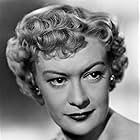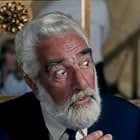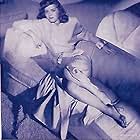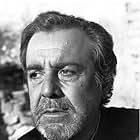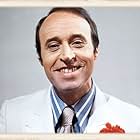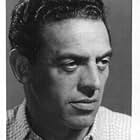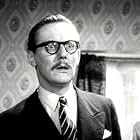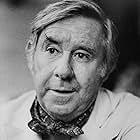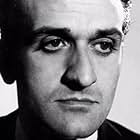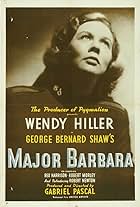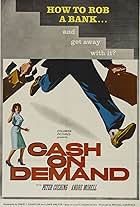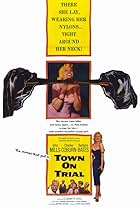An Englishman with a grudge against an insurance company for a disallowed claim fakes his own death, but is soon pursued by an insurance investigator.An Englishman with a grudge against an insurance company for a disallowed claim fakes his own death, but is soon pursued by an insurance investigator.An Englishman with a grudge against an insurance company for a disallowed claim fakes his own death, but is soon pursued by an insurance investigator.
- Nominated for 1 BAFTA Award
- 1 nomination total
Juanjo Menéndez
- Roberto
- (as Juan Jose Menendez)
José Calvo
- Porter
- (as Jose Calvo)
- Director
- Writers
- All cast & crew
- Production, box office & more at IMDbPro
Storyline
Did you know
- TriviaThe fifty thousand pounds sterling insurance claim would be equivalent to about one hundred forty thousand U.S. dollars at the time or about 1.4 million U.S. dollars in 2023.
- GoofsDuring his getaway towards the end of the film, the rear view mirror of Rex's Lincoln Continental appears and disappears between long shots and close ups.
- ConnectionsReferenced in Seance on a Wet Afternoon (1964)
Featured review
This movie surprised me. It started out as one type of movie and ended up as another - it was a pleasant enough surprise though.
Laurence Harvey plays charter pilot Rex Black who fakes his death allowing his wife, Stella, to claim the insurance. Although Harvey was not particularly loved by many of his peers, he made some great movies. I always liked him and his Rex Black is cocky and edgy.
Lee Remick plays Stella. Time spent watching Lee Remick on the screen is never wasted. She was an actress whose abilities were sometimes under-appreciated because she was so beautiful. She is as disarming here as she was in everything she did.
Alan Bates plays Stephen Maddux, an insurance agent who investigates Rex's death and later fancies Stella when they cross paths in Spain - he thinks she is a widow, and Rex assumes another identity. Bates plays it low key while Harvey's character becomes darker and more aggressive as he attempts further scams, and is prepared to do anything to stop his plans unravelling.
Sadly all three actors went far too early - cancer in each case.
Directed by Carol Reed, the film has an unusual energy. It starts out as a light caper film, but by the half way mark we realise that the game has become more dangerous. The ending has a similar touch to the one that made "The Third Man" so memorable.
The film was made in 1963, and although it benefits from great locations in Spain, it actually feels a little like British films of the 40's and 50's.
The score by William Allwyn has a lot to do with that. For a long while British film music had a distinctive sound with some brilliant scores. It had a different timbre to the typical Hollywood score. You could tell a film was British as soon as the main title music started, but by the late 50's, composers like John Barry and John Addison brought a fresh sound that was far more international. However the score for "The Running Man" was a throwback - it was Allwyn's last score - maybe Reed had asked for him - but it could almost be a score for a film in 1948.
Although "The Running Man" does not represent the best work of those involved it is more than watchable and has a couple of twists worthy of Hitchcock.
Laurence Harvey plays charter pilot Rex Black who fakes his death allowing his wife, Stella, to claim the insurance. Although Harvey was not particularly loved by many of his peers, he made some great movies. I always liked him and his Rex Black is cocky and edgy.
Lee Remick plays Stella. Time spent watching Lee Remick on the screen is never wasted. She was an actress whose abilities were sometimes under-appreciated because she was so beautiful. She is as disarming here as she was in everything she did.
Alan Bates plays Stephen Maddux, an insurance agent who investigates Rex's death and later fancies Stella when they cross paths in Spain - he thinks she is a widow, and Rex assumes another identity. Bates plays it low key while Harvey's character becomes darker and more aggressive as he attempts further scams, and is prepared to do anything to stop his plans unravelling.
Sadly all three actors went far too early - cancer in each case.
Directed by Carol Reed, the film has an unusual energy. It starts out as a light caper film, but by the half way mark we realise that the game has become more dangerous. The ending has a similar touch to the one that made "The Third Man" so memorable.
The film was made in 1963, and although it benefits from great locations in Spain, it actually feels a little like British films of the 40's and 50's.
The score by William Allwyn has a lot to do with that. For a long while British film music had a distinctive sound with some brilliant scores. It had a different timbre to the typical Hollywood score. You could tell a film was British as soon as the main title music started, but by the late 50's, composers like John Barry and John Addison brought a fresh sound that was far more international. However the score for "The Running Man" was a throwback - it was Allwyn's last score - maybe Reed had asked for him - but it could almost be a score for a film in 1948.
Although "The Running Man" does not represent the best work of those involved it is more than watchable and has a couple of twists worthy of Hitchcock.
Details
- Runtime1 hour 43 minutes
- Color
- Aspect ratio
- 2.39 : 1
Contribute to this page
Suggest an edit or add missing content











